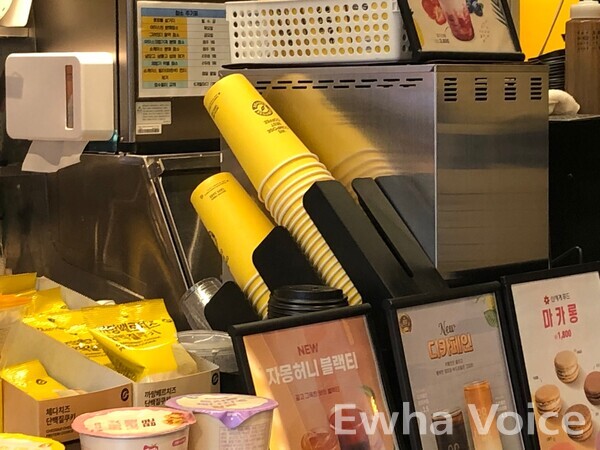
On Nov. 7, the Ministry of Environment announced the retraction of its sanction on using disposable paper cups. This was brought in together with indefinitely extending the ban on using plastic straws at cafés and restaurants as well as plastic bags at convenience stores.
First implemented in November 2022, the policy was introduced to reduce the amount of disposable items and promote an eco-friendly environment. Since the retraction was announced, it has been arousing different reactions from people.
Lee Mi Young, who has been running a café named Coffeeya for four years in Ulsan Metropolitan City, welcomes such a change.
“It is challenging to take orders, serve drinks, and do the dishes at the same time due to the limited workforce, especially during our busiest hours,” she said. “I am aware of the fact that using disposable items is harmful to the environment, but I cannot deny that it is much more convenient.”
Lee revealed that she has been getting several complaints from customers for providing paper straws as they become soggy once they come in contact with liquids. In addition, since paper straws are more costly than plastic ones in general, the new policy could be more cost-saving.
However, Lee Jinyoung, who runs Dongnae Coffee in Seoul Special City, was upset to hear the news. While both business owners and customers were getting used to cutting out disposable items, she feels like the government took a step back to square one.
From Lee’s point of view, each business is in a different situation regarding the use of disposables. For example, for street stall owners, it is inevitable for them to use disposable items.
“I think the government could have listened to each business owner’s opinion and then revised the policy accordingly, instead of radically changing it for all owners,” Lee said.
The retraction is even more disappointing to Lee as she has been making lots of efforts to reduce the amount of waste by providing reusable straws for dine-in orders and biodegradable items for take-out orders. She hopes every party involved – the government, environmental organizations, and individuals – would cooperate to less damage the planet.
Ana Vertuoso, a Brazilian student from the Graduate School of International Studies, was astonished by how much plastics were being used after arriving in South Korea this February. At the supermarket, she was taken aback because even the bananas were sold in styrofoam trays and wrapped in plastic.
Vertuoso understands that business owners prefer disposable items, but she thinks there are more sustainable solutions such as encouraging customers to use their own reusable bags by providing benefits. She believes the government should continue its efforts in reducing single-use plastic instead of reverting the progress.
Moreover, according to Vertuoso, Brazil also has a serious problem when it comes to disposable plastic usage.
“It is still very common to receive free plastic bags when shopping in Brazil, but the take-out culture is less prominent than South Korea, so there are not as many people carrying plastic cups or straws,” she said. “However, much like South Korea, Brazil still has a long way to go if it wishes to become a less wasteful country.”
Suyeol Hong, a director at the Resource Circulation Society & Economy Institute, worries that the retraction may deliver the wrong message that the government will allow wasteful consumption of disposables. He highlighted that the efforts needed for sustainability have been withdrawn.
Although the government declared its intention to gradually cut disposables by encouraging the individual’s participation, Hong doubts this measure which lacks regulations will not be effective enough to achieve carbon neutrality.
“This action unleashed the business owners’ desire to use disposable items,” Hong said. “Even if the withdrawal is only applicable to paper cups and plastic straws, some business owners may perceive this as permitting to use all kinds of disposables, which can be challenging to ban plastic cup consumption at the same time.”
Hong asserted that in the climate crisis era, individuals must prioritize sustainability regardless of the government’s restrictions. He stressed the importance of asking for reinforced policy because the individuals’ efforts are not big enough to ultimately resolve the problem.

